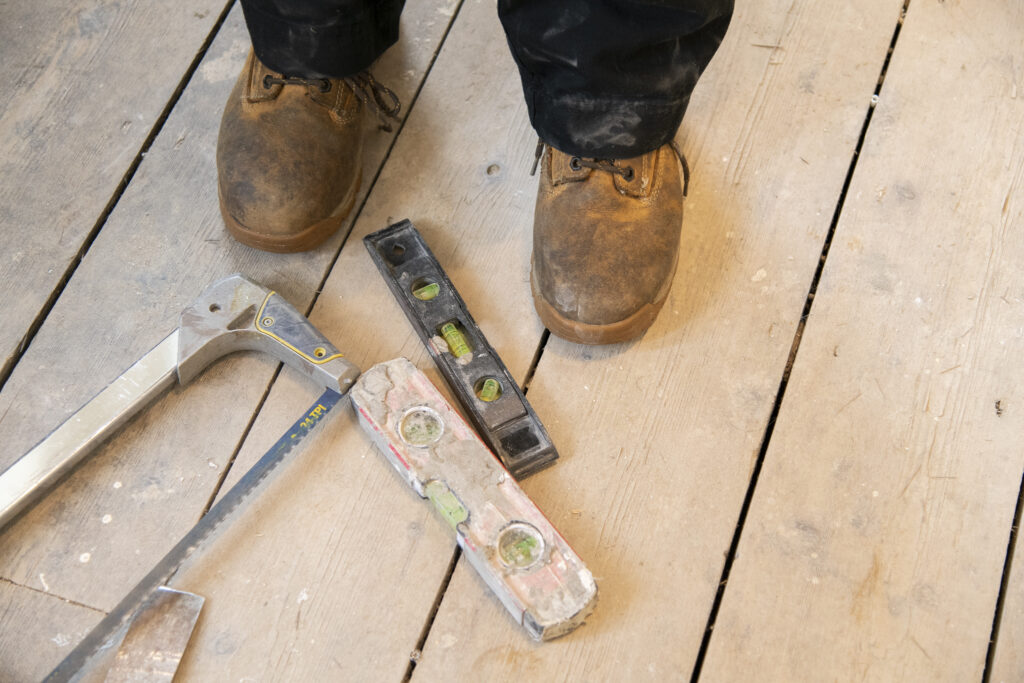How to Choose the Right Builder for the Job
Choosing the right team to deliver your home renovations or commercial remodeling is critical – critical to getting the completed look and finish you want, on time and on budget. Living on or managing a building project can be stress; but the right contractor will make the experience a lot more pleasant and headache-free. They will be able to smooth through any difficulties and find solutions as issues arise. On the other hand, hiring an inexperienced contractor can lead to delays and much more stress than you can imagine. So, we’ve created this step-by-step guide in how to search for and choose the right builder for your project.

First things first – Define the scope, time frame and budget
Before you start your search for a contractor, you must clearly understand what you need done, your budget, and when you need it done by. Let us assure you this is not overkill. This is how you keep control of costs and get things done on time. It ensures that you can effectively communicate with potential contractors, putting you in control an ensuring the project proceeds smoothly.
Contractors ask these questions first. It enables them to come up with an estimate of time and costs that match your expectations. Clearly defining the job, means getting a comparison quote is also far easier. It may even rule out certain capable contractors who have the right skillset and qualifications but are either already booked up or unable to meet your cost expectations.
Be transparent with your budget. An open budget with no upper limit makes it difficult for a contractor to quote accurately. This in turn is a sure-fire way to have the project exceed your cost expectations. A good contractor will also be creative with the money you have available – meaning if there is something you would love to have but cannot afford, they may be able to suggest more cost-effective alternative within or on budget.
Look for contractors
Now that you have clear in mind what you need done, it’s time to start the search for contractors. You can search online, use a trade directory such as Bark or Checkatrade, or ask for recommendations from friends, family, or colleagues who have had similar works done.
When evaluating potential contractors, it is crucial to look for those with the right experience, qualifications and certifications. Look for a portfolio of pictures of projects they have delivered. Equally important to look at are customer reviews. This will reassure you about the quality of work and instill confidence in your choice of contractor, knowing that they have a proven track record of meeting project needs.
Interviewing potential contractors – Set up a site visit
Don’t simply rely on what you see online or via hearsay. Once you have a list of potential contractors, discuss and share with them the details of your planned works and invite them ideally to come along to the property to quote. This gives you a chance to gauge what it would be like to work with them face to face.
During the site visit, explain again the scope of work. Ask them about any costs that you may have concerns about. If you haven’t found any while researching online, ask them for photos of similar works they have carried out. Do they have adequate insurance in place to cover the worst-case scenario? A useful question to ask is whether they can already foresee any challenges or additional costs having seen the space.
Certifications and Accreditations you may want to look for in a contractor
CHAS or SafeContractor: These health and safety accreditation schemes demonstrate a contractor’s compliance with industry standards. CHAS (Contractors Health and Safety Assessment Scheme) focuses on health and safety compliance, while SafeContractor covers health, safety, and environmental regulations. Both mean that a contractor will have more due diligence to carry out regarding risk assessments and methods for work before they even begin a project. Contractors with either accreditation are committed to maintaining a safe work environment.
Gas Safe and NICEIC Certification: The contractor must be qualified for any gas or electrical work. Gas engineers should be registered with Gas Safe. Electricians should be certified by the NICEIC (National Inspection Council for Electrical Installation Contracting). This ensures that any work carried out will comply with current building regulations and safety standards.
Choose the Right Contractor Based on Quotes
Having identified the key contractors you’d like to work with, it’s time to ask each to provide an estimate. A good estimate will include a detailed breakdown of their costs, including labour, materials, and any additional expenses. Compare contractors not solely based on pricing but also on the scope of work they can cover.
Be cautious of estimates that are significantly lower than others. This could indicate that the contractor is going to cut corners or has underestimated costs and scope. This could lead to problems and additional costs down the line. Choosing a contractor with a clear and comprehensive estimate is key, even if it’s not the lowest.
Contract and Warranty
Once you have narrowed it down to a shortlist before you choose the right builder, be sure to discuss contract terms. The agreement must outline the scope of work in detail with proper deadlines and payment schedules. Ask for information about what warranty they extend for their work, covering any issues that could arise after completion. Warranties protect you from faulty materials or poor artistry. This gives you peace of mind that the contractor stands behind their work.
Communication
Good communication is essential. This doesn’t mean that everything will always be perfect. Mistakes or errors will happen. A contractor who communicates clearly and is responsive will ensure the project runs smoothly from start to finish; any issues are dealt with and resolved quickly and effectively. Find out what is the best way to communicate with them and their team. This communication channel will be a crucial way for communicating changes, updates, and project progress between yourself and the team on site and any back office they may have, keeping everyone informed and reassured about the project’s direction.
Monitor Progress
The formal contract sets out KPIs and defines the scope of work. This will help the contractor and project team understand and monitor the progress of the work. What challenges are they facing, and how will they overcome those challenges? Once the project starts, stay involved and monitor the progress regularly. Check-in regularly not to micromanage but to ensure that work is completed in line with your expectations and the contract.
Choose the Right Builder for Success
How to choose the right builder for your project is not a decision to be taken lightly. It is worth investing the time in being thorough from the get-go before the works have even begun. Your project’s success rests entirely on the skills, reliability, and professionalism of the contractor you end up using. Whether you are renovating a house or a room, the scope of work will help you identify the right ‘man for the job’. Ultimately, the right contractor will not only complete the project but will do so in a way that aligns with your vision, timeline, and budget. By prioritising research, verification of credentials, and communication, you set the stage for a successful project that meets your standards, avoids costly setbacks, and delivers the desired results.

